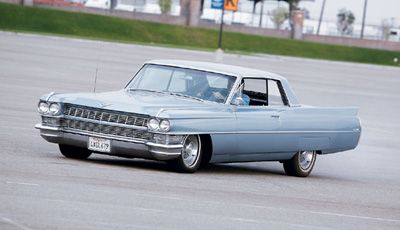
Our friend John and his son, Greg, have been driving this mostly stock '64 Coupe De Ville for a few years. The big boat weighs in at about 2 3/4 tons, and even more when big John climbs in and puts his heavy right foot to the gas pedal. The sum of all that mass more than exceeded the safe stopping power of the 43-year-old drum brakes. During some recent 60-0-mph testing, those drums were so toasted after a couple of hard practice stops that the car was too dangerous to drive and had to be trailered home.
The next stop was ABS Power Brake in Orange, California. In addition to manufacturing power-brake boosters, high-performance master cylinders, and power-steering boxes, ABS makes disc-brake kits for all kinds of late-'40s to early '70s cars and trucks. The company currently has the measurements to provide complete kits for approximately 50 different applications, including Tri-Five Chevys, Fairlanes, Impalas, Thunderbirds, most popular musclecars, '47-72 Chevy pickups, '48-70 Ford F-series trucks, and Cadillacs like this one. If ABS doesn't have brakes for your car or truck, the guys can fabricate them using your spindles, steering arm, and bolt pattern. This upgrade doesn't cost radically more than rebuilding the stock drums, and provides much better performance.
The Cadillac disc kit that went on John and Greg's '64 is a recent development and presented a challenge, since the center portion of the stock rims wouldn't clear the caliper. It's a familiar problem to early '60s Cadillac owners who sometimes solve it by switching to rims from disc brake- equipped Cadillacs. Since John wanted to retain the stock wheels, Pedro Gomez substituted 11-inch rotors for the 12-inchers he would use otherwise.
The improvement was significant. The front discs, combined with a new master cylinder, double-diaphragm booster, and disc/drum proportioning valve, made an impressive difference.
"The car drives much better now. The new brake system is very well-balanced and matched to a Cadillac," John says. "The brakes aren't touchy, so it's easy to stop without being jerky-and if I need to stop fast, the harder I push the pedal, the faster it stops."
More testing backed up that seat-of-the-pants impression. Although the drum-brake failure during the pre-upgrade testing prevented us from getting any hard numbers, we deduced the 60-0 stopping distance would have exceeded 250 feet. With the ABS discs, that shrunk to 167 feet and a stopping time of 3.87 seconds. That's impressive, especially with such a heavy car rolling on non-performance tires.
According to John, "The biggest improvement is something you can't measure-confidence in the brakes. Now I can relax and enjoy driving the car without worrying about rain or repeated stops in heavy traffic."